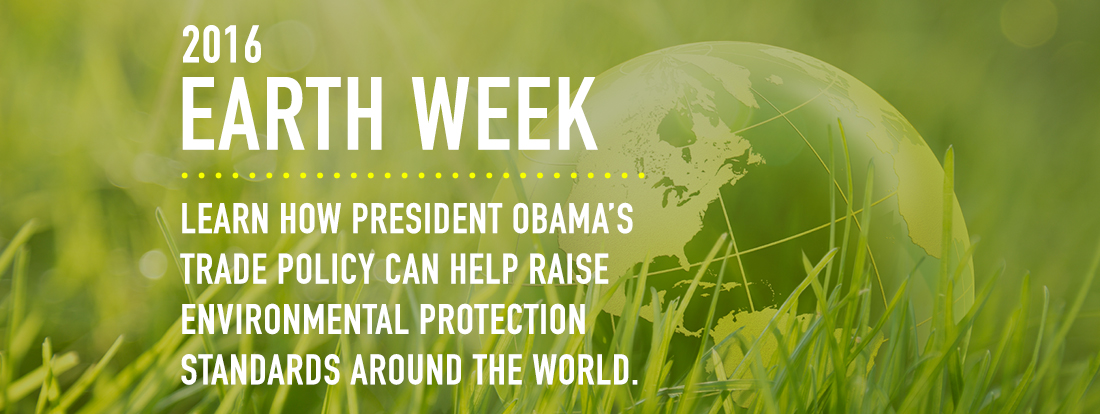By U.S. Trade Representative Michael Froman
Earth Day — and by extension, Earth Week — is an annual opportunity to challenge ourselves to do more individually and collectively to safeguard our planet.
Trade policy can help. From ensuring the sustainability of our marine fisheries and combatting wildlife trafficking, to protecting our forests from illegal logging activities and improving access to clean, green technologies, President Obama’s trade policy is helping to raise environmental standards around the world – to address critical environmental issues and to level the playing field for our workers and firms. This Earth Week, we highlight a few of the ways that trade policy is helping us fight environmental threats of critical importance:
- The Trans-Pacific Partnership (TPP) agreement contains the most comprehensive, cutting-edge environmental standards of any of our trade agreement to date. TPP will help in the fight against illegal logging and wildlife trafficking through enhanced national and regional actions, helping to protect and conserve iconic species such as rhinos and elephants. TPP will help to protect our oceans by combatting illegal, unregulated, and unreported (IUU) fishing that is endangering fish stocks around the world and marine pollution, and for the first time in any trade agreement, TPP will prohibit harmful fisheries subsidies, including those that contribute to overfishing. Across the Asia-Pacific region, TPP will promote increased environmental enforcement, along with cooperative efforts to address environmental challenges, from conservation of endangered species to the protection of wetlands.
- The Transatlantic Trade and Investment Partnership (T-TIP) with the European Union is an opportunity for the United States and the European Union to build a lasting framework to support high levels of environmental protection. In T-TIP, we are seeking binding and enforceable environmental commitments, as we have secured in our other recent trade agreements. T-TIP could also improve coordinated capacity building efforts with the dozens of developing countries with which they have trade and investment relationships.
Together, TPP and T-TIP could be game changers – combined, they account for two-thirds of the global economy, 32 percent of the global marine catch, 44 percent of global fish and seafood exports, and 71 percent of global timber and wood products. This collective market power could move the needle in a positive direction for economic and environmental reforms.
- The Environmental Goods Agreement (EGA), is an ambitious initiative we are leading with 44 countries in the World Trade Organization that aims to eliminate tariffs on a range of environmental technologies such as wind turbines, water treatment filters, and solar water heaters. By eliminating tariffs on green technologies we can make these products cheaper and more accessible for everyone, while creating new export opportunities for U.S. businesses.
- The United States is also leading the way to reinvigorate efforts in the WTO to reform harmful fisheries subsidies.
We are seeing the environmental benefits of U.S. trade policy in the implementation and enforcement of existing trade agreements. Our trade agreement with Peru, for example, catalyzed efforts in Peru to create an independent forest oversight body, amend Peruvian criminal code to include substantial penalties for illegal logging and wildlife trade, and overhaul Peru’s forestry and wildlife laws. There has been significant progress in these areas, but there is still much work to be done, which is why we recently employed one of the monitoring tools under our agreement and requested that Peru verify the legality of a timber shipment that entered into U.S. commerce. This monitoring tool is designed to ensure enforcement of Peruvian laws throughout the supply chain, so that timber importers and consumers can be confident that the timber that they buy from Peru is legally harvested and exported.
Global environmental challenges call for global solutions and a multifaceted approach. We are working to ensure that U.S. trade policy is part of the solution so future generations have many more Earth Days to celebrate in the years to come.
For more background on how we are tackling environmental challenges through trade:
- TPP in the Wild Fact Sheet
- TPP for the Sea Fact Sheet
- TPP for the Trees Fact Sheet
- What They're Saying - TPP Environmental Protections
- Environmental Goods Agreement: Promoting Made-in-America Clean Technology Exports, Green Growth and Jobs
- Tackling Environmental Challenges Through Trade
- U.S. Trade Representative Michael Froman and Congressman Sam Farr Highlight the Environmental and Economic Benefits of the Trans-Pacific Partnership
- CITES and Trade Agreements – Partnering to Combat Wildlife Crime and to Achieve Sustainable Development
- On the ground in Gabon: The path forward for trade in Africa
- IUU Fishing and Seafood Fraud Action Plan: Using Trade to Combat Illegal Fishing
- National Strategy to Combat Wildlife Trafficking Implementation Plan: Using Trade Agreements to Fight Wildlife Trafficking








